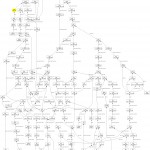You may remember a post a few days ago about submergence-tolerant rice. Our friends at IRRI have been kind enough to explain to me where the gene in question — sub1 — came from.
I hope I get this right. It seems the immediate parent for IR64-sub1 was from the cross IR49830, which in turn came from the cross IR22385, made in 1978. The source of the gene at the time was a line called FR13A, which was derived from a germplasm accession called IRGC 8887. That was acquired by IRRI in 1963 from India, but with no further passport data.
If you want to get an impression of the complexity of the pedigrees of modern varieties, below is the one for IR64-sub1, with IRGC 8887 highlighted in yellow, thanks to the pedigree visualization tool that IRRI has been developing (click to enlarge).
It’s a great illustration of the reason for the Multilateral System of access and benefit sharing being put in place by the International Treaty for Plant Genetic Resources for Food and Agriculture. In a bilateral system, such as the one envisaged by the Convention on Biological Diversity, how would you work out the contribution of IRGC 8887 — or indeed any of the other germplasm involved in the pedigree — to the overall success or otherwise of the final product?
